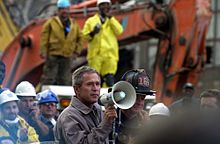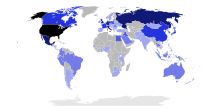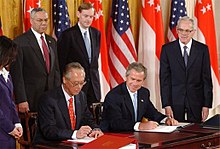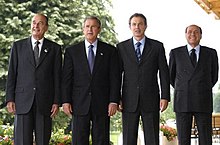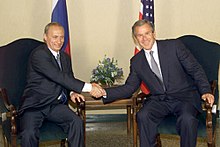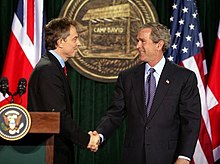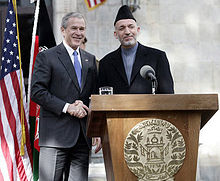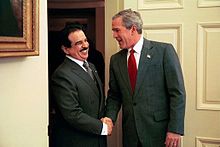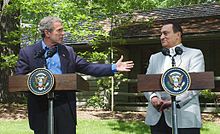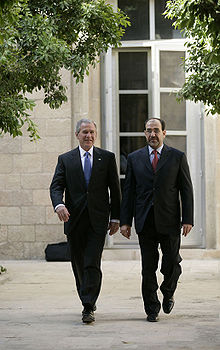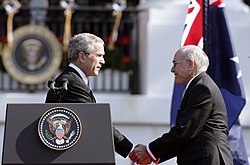Foreign policy of the George W. Bush administration
[3] Also during the 2000 presidential campaign, Bush's foreign policy platform included support for stronger economic and political relationship with Latin America, especially Mexico, and a reduction of involvement in "nation-building" and other small-scale military engagements.
[15] Bush outlined what he called the "Axis of Evil", consisting of three nations that, he argued, posed the greatest threat to world peace due to their pursuit of weapons of mass destruction and potential to aid terrorists.
[76] In 2001, despite a confrontation between Washington and Beijing over the downed EP-3E Aries II spy plane which collided with a Chinese fighter jet, President Bush still declared his support for China's entry into the World Trade Organization.
[79] During the tenure of the George W. Bush administration, relations between India and the United States were seen to have blossomed, primarily over common concerns regarding growing Islamic extremism, energy security, and climate change.
According to Laskar, the UPA rule has seen a "transformation in bilateral ties with the US", as a result of which the relations now covers "a wide range of issues, including high technology, space, education, agriculture, trade, clean energy, counter-terrorism, etc.".
An Open Skies Agreement was signed in April 2005, enhancing trade, tourism, and business via the increased number of flights, and Air India purchased 68 US Boeing aircraft at a cost of $8 billion.
[76] On December 9, 2003, the Japanese Diet passed the Humanitarian Relief and Iraqi Reconstruction Special Measures Law that allowed Prime Minister Koizumi to dispatch the Self Defence Forces (SDF) to Iraq.
Furthermore, President Bush and Kim Dae-Jung expressed satisfaction that the bilateral alliance is not limited to cooperation in security matters but that the comprehensive partnership has expanded and developed to all areas, including political, economic, and diplomatic arenas.
Afterwards, South Korea took only the role of providing medical and vocational training by assisting the United States with only two dozen volunteers working inside Bagram Air Base, north of Kabul.
However, Nursultan Nazarbayev of Kazakhstan and Ilham Aliyev of Azerbaijan, both undemocratically elected and fiercely autocratic,[citation needed] received official state visits to the White House,[108] along with increased economic and military assistance.
"There is simply no place in a Europe whole and free for a regime of this kind", Bush said in a letter to the US Congress announcing his executive order, which affects assets held in the United States or by US financial institutions.
One vocal protester managed to get into the Danish parliament during the period before the war, where he poured red paint on the prime minister while yelling "Du har blod på dine hænder" (literally: "You have blood on your hands").
Despite British and American pressure, Chirac threatened to veto, at that given point, a resolution in the UN Security Council that would authorise the use of military force to rid Iraq of alleged weapons of mass destruction, and rallied other governments to his position.
Aznar actively encouraged and supported the Bush administration's foreign policy and the U.S. invasion of Iraq in 2003, and was one of the signatories of The letter of the eight defending it on the basis of secret intelligence allegedly containing evidence of the Iraqi government's nuclear proliferation.
During the electoral campaign Zapatero had promised to withdraw the troops if control in Iraq was not passed to the United Nations after June 30 (the ending date of the initial Spanish military agreement with the multinational coalition that had overthrown Saddam Hussein).
In 2002, based on UNICEF figures, Nicholas Kristof reported that "our invasion of Afghanistan may end up saving one million lives over the next decade" as the result of improved healthcare and greater access to humanitarian aid.
[143] Efforts to kill or capture al-Qaeda leader Osama bin Laden failed as he escaped a battle in December 2001 in the mountainous region of Tora Bora, which the Bush administration later acknowledged to have resulted from a failure to commit enough U.S. ground troops.
Critics claim that anyone accused of a crime has a right to a fair trial and question whether people like Mullah Abdul Salam Zaeef, the former Taliban ambassador to Pakistan, can be called an "unlawful combatant".
[155][156] According to the declassified April 2006 National Intelligence Estimate, "United States-led counterterrorism efforts have seriously damaged the leadership of Al-Qaeda and disrupted its operations; however, we judge that al-Qa'ida will continue to pose the greatest threat to the Homeland and US interests abroad by a single terrorist organization.
[178] Beginning with his State of the Union Address on January 29, 2002, President Bush began publicly focusing attention on Iraq, which he labeled as part of an "axis of evil" allied with terrorists and posing "a grave and growing danger" to U.S. interests through possession of weapons of mass destruction.
"[192] President Bush in his address to the nation from the Oval Office on March 19, 2003, officially announced the beginning of the invasion of Iraq, here he stated "On my orders, coalition forces have begun striking selected targets of military importance to undermine Saddam Hussein's ability to wage war.
The initial success of U.S. operations increased his popularity, but the U.S. and allied forces faced a growing insurgency led by sectarian groups; Bush's "Mission Accomplished" speech was later criticized as premature.
On June 16, 2004, the USA's 9/11 Commission filed an initial report on its findings, stating that it found "no credible evidence" of a "collaborative relationship" between pre-invasion Iraq and Al-Qaeda or of Iraqi involvement in the 9/11 attacks.
Officials and diplomats disputed the evidence for this claim, especially after a document describing an attempted purchase from Niger, which was presented to the United Nations Security Council by Colin Powell, was found to be a forgery.
Egyptian President Hosni Mubarak commented Bush's policies had led to an 'unprecedented hatred' of Arabs for the U.S.[229] During the 2006 Lebanon War, On July 14, 2006, the US Congress was notified of a potential sale of $210 million worth of jet fuel to Israel.
[230] It was reported on July 24 that the United States was in the process of providing Israel with "bunker buster" bombs, which would allegedly be used to target the leader of Lebanon's Hezbollah guerilla group and destroy its trenches.
"[235] On July 26, 2006, foreign ministers from the US, Europe, and the Middle East that met in Rome vowed "to work immediately to reach with the utmost urgency a ceasefire that puts an end to the current violence and hostilities".
[267] Saudi Arabia engaged the Washington, D.C., lobbying firm of Patton Boggs as registered foreign agents in the wake of the public relations disaster when knowledge of the identities of suspected hijackers became known.
[279] Under separate executive orders signed by Bush in 2004 and later 2007, the Treasury Department froze the assets of two Lebanese and two Syrians, accusing them of activities to "undermine the legitimate political process in Lebanon" in November 2007.
[297] "Over the course of more than two years, the government of Zimbabwe has systematically undermined that nation's democratic institutions, employing violence, intimidation, and repressive means including legislation to stifle opposition to its rule", Bush said in the order.
